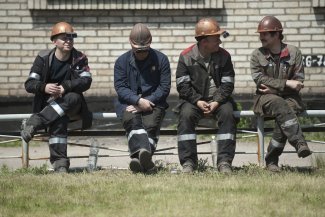

In this photo taken on 7 June 2016, trade unionists protest in Kiev, Ukraine over proposed changes to the labour code.
The mainstreaming of language and concepts such as ‘liberalisation’, ‘deregulation’, ‘debureaucratisation’ and ‘optimisation’ is the order of the day in Ukraine’s current socio-economic and legal landscape. This trend is even more pronounced in the Ukrainian parliament (the Verkhovna Rada). There, you will not find in modern draft laws words like ‘social justice’, ‘social dialogue’, ‘decent work’ or ‘equality’. For the most ardent representatives of neoliberalism that fill these chambers, these words are considered a Soviet-style anachronism. “The market will fix and regulate everything!” they cry. After all, capitalism is but a “sober calculation of net profit”.
And it is these words and ideas that are being widely used in the new legislative acts and administrative documents that are changing the legal framework of Ukraine’s social state beyond recognition. Since the country gained independence in 1991, a form of Aesopian language has been created in Ukrainian jurisprudence, designed to hide the true meaning of adopted documents, as well as the true intentions of their authors and sponsors.
As a slave, Aesop – the ancient Greek fabulist and storyteller renowned for his eponymous collection of fables – could not directly point out shortcomings of the masters in his stories, so he replaced their images with those of animals with appropriate characteristics. In present-day Ukraine, the government cannot directly declare its intention to eliminate the welfare state and the century-long gains of the working class and is therefore forced to use deliberately deceptive language and doublespeak.
In literature, Aesopian language has been used since the late 18th century to circumvent censorship. In modern law-making, it is used to push through draft laws designed to restrict the rights of certain segments of the population, becoming part of the practice of preparing legislative acts without any pushback from the general public. Therefore, it is up to trade unions, and other parts of civil society, to disclose the veiled meaning of these alarming draft laws. Until recently, the evolution of labour and social legislation in Ukraine took place without destroying the groundwork laid down by previous laws. But with the transfer of state assets into the hands of oligarchic capital as a result of the mass privatisation of state-owned entities, quantitative changes have transmuted into qualitative ones, leading to the creeping dismantling of social protection.
Among the main reasons for the destruction of the social state has been the inability of government to promote people-centred policies that also produce economic growth, the implementation of which would ensure the stability of the state, national unity and good cooperation between civil society and government. Instead, each successive government claims that there is not enough money in the public purse, and so the government spending cuts go deeper and deeper.
The project of turbo liberalisation
Today Ukraine is one of the poorest states in Europe and the most polarised in terms of the income gap between the rich and the poor. The only solution that is offered is to liberalise everything – the economy, labour, social policy. Every citizen must take care of oneself. The state owes nothing to anyone, neoliberals argue. The first attempts at ‘turbo liberalisation’ in 2020 were stopped thanks to the actions of national trade unions with strong international support. As a result, the government abandoned wholesale attempts to liberalise the labour code, resorting to targeted changes instead.
However, the project of liberalisation was not abandoned. Forces simply regrouped and put forward the former Georgian president Mikheil Saakashvili, who now heads the executive committee of the National Reforms Council of Ukraine. With his regional Office of Simple Solutions, Saakashvili is working to help Ukraine “overcome the deadly resistance of the bureaucracy against the projects we are proposing” by drafting bills on legal, tax and labour reforms.
The results of such efforts can be seen with draft law No 5371 which was proposed in April 2021. Ostensibly it seeks to “simplify the regulation of labour relations” but this phrase conceals its true purpose: introducing a new contractual regime for workers in small and medium-sized businesses with less than 250 people. If the draft law is passed, all working conditions will be determined by an employment contract, and not by labour law.
Ukraine is following in the footsteps of Belarus and Georgia, which in 1999 and 2006 respectively resorted to the widespread transition to short-term, individual labour contracts, which are an ineffective form of labour relations and are seldom used elsewhere in the world.
In Belarus, for example, despite high levels of employment, almost 90 per cent of workers are on fixed-term employment contracts as a result of a presidential decree. This authoritarian approach to regulating labour relations has been heavily criticised by the International Labour Organization (ILO) and the international trade union movement. As a result, Belarus was excluded from the European Union’s general system of trade preferences for its infringement of workers’ rights.
As for Georgia, following the introduction of brutal labour reforms by the libertarian Saakashvili, unofficial data suggests that as many as 1.6 million people left the country, which is a huge figure for a country of only 3.7 million people. Only in 2020 did Georgian parliamentarians decide to reverse some of the most egregious aspects of the labour reforms introduced almost 15 years ago.
In the current discussions about the future of work, as noted at the ILO’s 100th anniversary conference, respect for labour rights is highlighted as central to economic development. However, various European governments are changing their labour codes to deprive workers of social gains. In France, for example, controversial labour market reforms were pushed through in 2017 and changed the conditions for fixed-term contracts, the mechanisms for resolving disputes between employers and employees, and limited the amount of monetary compensation possible upon dismissal of an employee.
The Ukrainian version of labour law change was prepared in the spirit of the IMF and World Bank-inspired reforms that took place in Georgia 15 years ago, but it fails to acknowledge the need for the state to create an appropriate institutional framework that maintains a balance between flexibility for business and respect for workers’ rights in the context of the globalised economy, digitalisation, teleworking and other trends in the modern labour market.
Opening a Pandora’s box
Undoubtedly, the authors of these amendments understand that these draft laws fail to comply with international labour standards, and therefore hide them under veiled language. On 2 June 2021, the Verkhovna Rada adopted in the first reading draft law No 3515 ‘On Amendments to Certain Legislative Acts of Ukraine Regarding the Settlement of Issues of the Formation of a Living Wage and the Creation of Prerequisites for its Increase’. According to the explanatory note attached to it, the purpose of this draft law is to ensure the constitutional right of citizens to an adequate standard of living. But in fact, if it is adopted, this law will end the scientifically grounded definition of a living wage as a social standard leading to the disruption of all the other standards that derive from it, like minimum pensions and social benefits. This will hit all segments of the population.
Another example is the draft law ‘On the Safety and Health of Workers at Work’. The terminology used in this draft law deviates from the concepts used internationally, especially with regards to occupational health and safety. This draft law simply reduces the level of worker protection and deprives workers of the right to benefits and compensation for work in difficult working conditions guaranteed by the current laws.
In declaring, on the one hand, that human labour is a key resource, and starting a race to the bottom in their pursuit of the maximum reduction of labour rights, state intervention and social standards on the other, the authors of these draft laws are opening a Pandora’s box.
After all, in curtailing workers’ rights to organise, collectively bargain and strike, it is possible to bring the situation to a point where workers lose patience and an unexpected, uncontrollable explosion of social unrest occurs. The dismantling of social protection could also lead to a further increase in labour migration, in addition to the five million Ukrainians who have already left the country to seek better working conditions and wages abroad. What is the point of bringing investment to Ukraine if there is no-one to work in the poor-quality jobs that it creates? Already, there are fewer people paying towards pension contributions in Ukraine than there are pensioners. What is next for a state with a population of 42 million people? With such social baggage, the guarantee of social protection is not just a matter of principle, it is a matter of national security.












